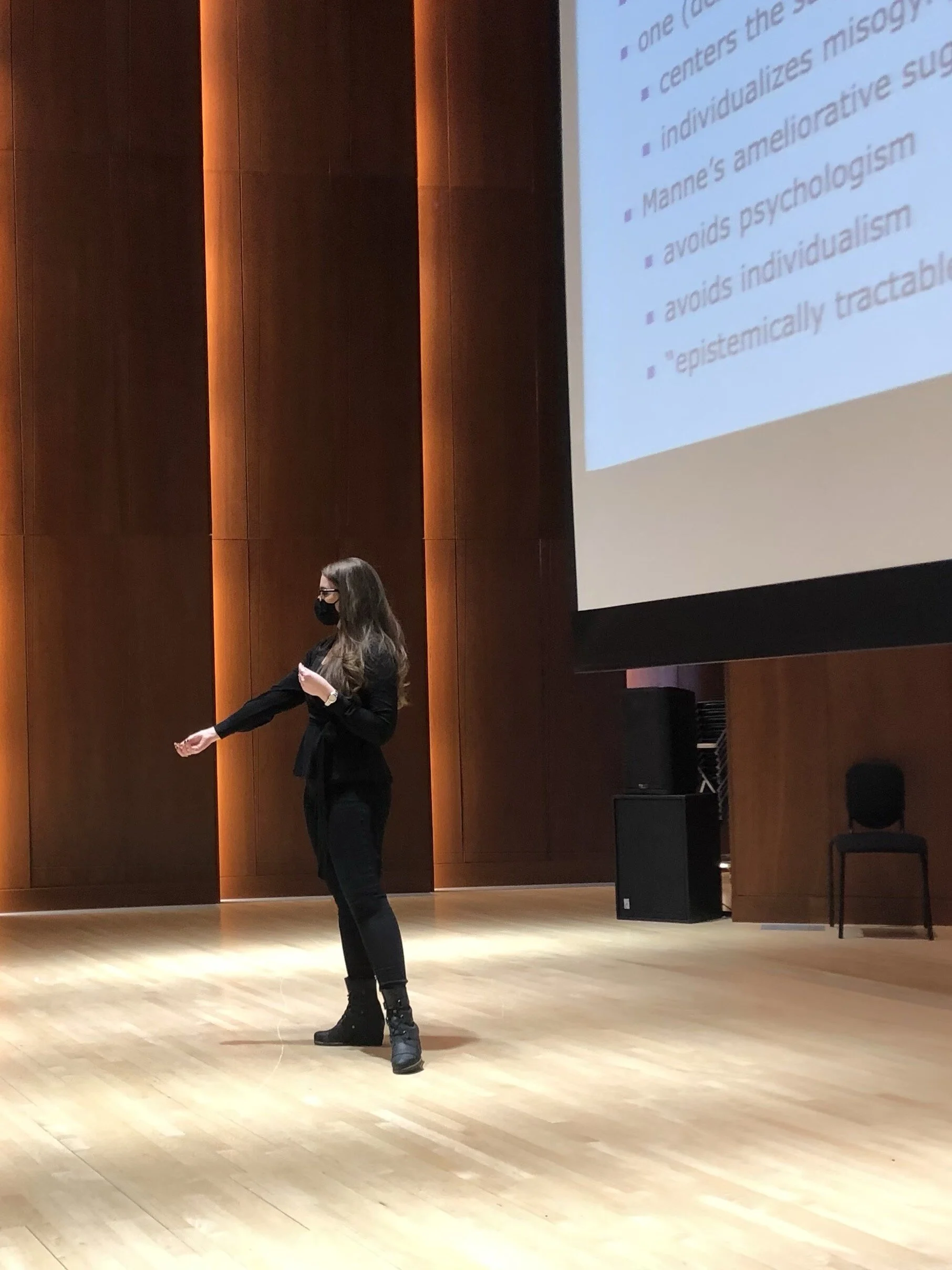Publications
My efforts in publishing are focused on making philosophy available to students and general audiences at no cost.
“Psychological Approaches to Personal Identity: Do Memories and Consciousness Make Us Who We Are?” (1000-Word Philosophy: An Introductory Anthology), 2022
This short piece on personal identity invites readers to consider theories according to which being the same person over time is a matter of being psychologically connected to past and future selves. Psychological approaches to personal identity are intuitively plausible but yield some puzzling implications when considering a possible future. See for yourself here.
“Are we Animals? Animalism and Personal Identity” (1000-Word Philosophy: An Introductory Anthology), 2021
This short piece on personal ontology invites readers to consider the animalist’s thesis, ‘We are animals’, including its purported implications. Animalism is motivated in part by a convincing Thinking Animal Argument, but it’s also associated with some potentially counterintuitive consequences. This essay sketches initial introductions to these issues. You can read the essay here.
“What do we do About Religious Disagreement?” (Philosophy of Western Religions: An Open Educational Resource), 2019
In this chapter of an OER Philosophy of Religion textbook, students consider possible responses to realizing that intelligent, well-intentioned people sometimes disagree with us about religious propositions. If you find yourself in such a disagreement, what does reason require of you? Can you stand firm? Must you withhold judgment altogether? Or perhaps reduce confidence in your belief? You can explore the options here.
“God, Morality, and Religion” (Introduction to Ethics: An Open Educational Resource, jointly published in Religions), 2019
In this chapter of an OER Ethics textbook, students confront a philosophical dilemma: Either God determines the moral facts, or God does not. If God does, then morality seems arbitrary. If God does not, then God seems to not be omnipotent. Both outcomes are bad results for the theist, and the chapter sketches these costs and possible responses. You can consider these issues here.
Research
My research interests are in metaphysics, specifically personal ontology. I examine the relationship between contemporary accounts of what we are and contemporary puzzles that arise in material object metaphysics. Ultimately, I argue, the difficulty of reconciling accounts of our nature with satisfactory solutions to these puzzles should prompt us to endorse an immaterialist personal ontology. More narrowly, I argue that certain solutions to puzzles require revisionary concessions that are unacceptable for defenders of many ontologies. Animalists, for instance, are on the hook for providing a plausible solution to the problem of the many. Constitutionalists must respond to the notorious grounding problem. But even immaterialists must have an eye toward these puzzles when considering what variety of immaterialism should be endorsed. And while immaterialism itself need not be associated with any particular religious notions, those concerned with religious conceptions of our nature may face further theoretical constraints.
Draft: Too Many Animals, Too Many Thinkers
Animalism, the thesis that each of us is a human animal, is a prominent materialist account of what we are. Animalism is often motivated by an attractive line of reasoning, the Thinking Animal Argument. And, independently, animalism has been challenged by appeals to a metaphysical puzzle, the problem of the many. In this paper, I draw attention to the relationship between the Thinking Animal Argument and the problem of the many. I further argue that in virtue of this relationship, animalists are left in an unfortunate position: animalists cannot hold onto their most successful argument without undermining animalism itself. (Draft)
Interdisciplinary Work
Interdisciplinary Studies Major
Students at Graceland University have the opportunity to design their own program of study as an alternative to existing majors. Six of my students designed Interdisciplinary Studies majors that draw heavily on Philosophy, in concert with disciplines like English, Communication, Religion, Sociology, Art, and Psychology. These programs culminate in a capstone that represents high-quality interdisciplinary work characteristic of a college graduate.
Honors Colloquia
In conjunction with Graceland University’s Honors Program, I coordinated a colloquium series entitled Bodies and Minds, which incorporated instruction from colleagues in Religion, Psychology, English, Sociology, and Music in addition to Philosophy. I also contributed philosophical perspectives for the Climate Change colloquium series.
Guest Teaching
To offer a philosophical perspective, I led class sessions on accounts of misogyny and sexism for a Gender and Sexuality Literature course. In an interdisciplinary seminar on Intellectual Curiosity, I facilitated a discussion about epistemology and intellectual virtue.
Graceland University Food Symposium
On March 23, 2018, I gave a presentation at Graceland University's annual Food Symposium, which "brings together a diversity of voices that speak on economic, social, or environmental issues as they relate to our food systems." My session involved a discussion of how the decisions about what we eat have ethical implications. We discussed how the decisions we make at mealtimes are moral decisions, not just practical or preferential decisions. We appealed to a variety of philosophical approaches to assess why what we put on our plates has moral weight.
What is Spirituality?
Matt Frizzell and I held an interfaith event on November 8, 2017, to discuss the question, "What is Spirituality?" The event prompted campus and community members to reflect on the nature of spirituality, the variety of ways that people approach spirituality, and the role it plays in everyday life.
Kristin explains Kate Manne’s analysis of misogyny in Gender and Sexuality.
Reformation 500 presenters converse following the panel discussion
Reformation 500 - Interdisciplinary Roundtable
A group of faculty and students at Graceland University held an interdisciplinary roundtable in Fall 2017 to mark the 500th anniversary of the Protestant Reformation. Panelists shared reflections on how the Reformation influenced their respective disciplines. I presented points addressing the relationship between faith and reason and connected the Reformation phenomenon to the epistemology of religious disagreement.
Research Assistance
I worked for several years as a research assistant for Professor Robert McKim at the University of Illinois to support several of his projects, including 'On Comparing Religions in the Anthropocene' and Religious Perspectives on Religious Diversity.


